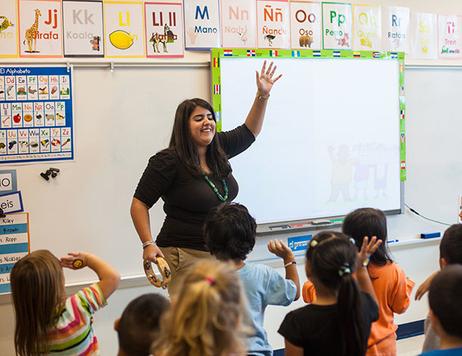Ask the experts and they all agree— schools with robust foreign language programs can bring students to the next level.
Public schools that invest in teaching foreign languages, whether through a full-fledged program or just a few classes, are certain to see the benefit in their student body, extracurriculars, and overall reputation. Full language programs start at an early age, immersing children in language classes every year from K-12, with extracurricular clubs, field trips, and learning experiences to enhance their language education.
It’s clear there is currently a gap in language education. As of 2008, only 18.5% of K-12 students were enrolled in a foreign language class. From 1997 to 2008, public and private elementary schools offering foreign language instruction decreased from 31% to 25%. These numbers are simply not acceptable.
This video outlines the benefits of learning a foreign language.
There are many reasons why schools, even those at the most elementary levels, should institute a foreign language program into their core curriculum. Dr. Jennifer Austin, an associate language professor at Rutgers University, is an adamant believer in the benefits of language studies. “Researchers have found that there are lifelong cognitive and academic benefits to becoming bilingual.”
Robert Riger, Vice President and Director of Pimsleur Language Programs, believes foreign language is the gateway to the rest of the world. “At an age where students begin to form individual preferences, dreams, and set priorities, it’s a clear roadmap to the next step. For many, it’s a passport to global citizenship, to dreams of connection with future friends and with their own future selves. It puts much of their other schoolwork into context and brings concrete connections to formerly abstract skills and lessons in history, civics, or science.”
However, there remains some concern that the United States is falling behind in terms of foreign language study when compared to other nations. Just take a look at China, a nation that has more English students than the entire United States population. One would think global competition would be reason enough, but there are many more reasons for educators to invest in language programs.
We paneled a few language experts and learned about the most impactful benefits of foreign language programs. After this read, you may just try taking a class yourself.
This video explains the benefit of young people learning a second language.
1. Deeper Thinking
Yangyang Cheng, Founder, and CEO of online Mandarin language company, YoyoChinese.com, says that foreign language classes can take our brains to entirely new levels. “Learning a foreign language increases concentration and develops new areas of the brain, in addition to boosting the brain's natural ability to process information.” In this way, learning languages helps humans truly elevate the way they learn and think.
“One of my students, a mom to a six-year-old, has told me she's noticed an increase in her child's attention span after learning Mandarin for just a few months.”
Dr. Austin recommends getting children started early and giving them access to continued exposure over years of study. “The cognitive benefits of bilingualism which are found on tests of executive function are only seen in children who have had intensive exposure to a second language over several years. (My school) HoLa, is a K-8 charter school in Hoboken, NJ, which offers a rigorous curriculum delivered in both Spanish and English by teachers trained in innovative strategies specific to dual-language education, with the goals of academic excellence and bilingualism for all students.”
Robert Riger concurs. “At an age where students begin to form individual preferences, dreams, and set priorities, it’s a clear road map to the next step.” In his experience, he has seen that students of language “demonstrate higher-order abstract and creative thinking.” To help children build this deeper level of thinking, Pimsleur Language Programs offers self-instructional spoken language courses in 50 languages. Courses integrate culture, grammar, and comprehension into daily 30-minute audio lessons.
2. Encourages Depth and Extracurricular Activities
Foreign language classes inspire students to learn about new cultures and explore areas they otherwise may not. Robert goes on to mention that schools that “integrate foreign language learning into the curriculum often see increased engagement across the board in extra-curricular activities like sports, clubs, student travel, and civic and leadership activities.” These areas allow school districts to get more for their money than they would with other classes.
Marc Anderson, CEO of online English startup Talk to Canada, says this depth and interest can last a lifetime. “Students will grow into cosmopolitan adults when they're older.” This is increasingly important in a globalized world, with digital technology taking down international boundaries like never before.
As Ms. Cheng aptly states, “Picking up a second language brings benefits that go beyond padding resumes.”
3. Improves Test Scores
Many educational professionals agree that foreign languages help improve test scores across the board. Learning languages over a period of time can help students excel in the timed test; an important challenge students must conquer at all levels, particularly if they are college-bound.
Robert Riger cites a study by the College Board which clearly shows “that students who studied a foreign language for at least four years scored more than 100 points higher on each section of the SAT than students who took half a year or less.”
Yangyang Cheng says that results are achieved through prolonged exposure to a language, rather than intensive language study in the weeks or months before a particular test. “The cognitive benefits of bilingualism…are only seen in children who have had intensive exposure to a second language over several years.” This is a clear indicator for educators and Boards of Education—establish a system that offers students classes over a number of years.
4. Opens a World of Possibilities
Dr. Luz Claudio, Tenured Professor and Chief of the Division of International Health, teaches preventative medicine at a large medical school in New York City. In this role, Dr. Claudio mentors many eager medical school hopefuls on the importance of languages.
“Most students coming into these fields want to have a global training experience. They hope to spend a portion of their time as an exchange student in another country. Foreign language skills are critically important for opening the door of possibility to have a great learning experience in another country. For instance, I direct an International Exchange Program for which I can only select 10 students per year. We receive over 250 applications annually. Foreign language skills are often the deciding factor when we are selecting candidates.”
After graduation, Dr. Claudio believes that foreign language skills can mean the difference between having an average practice or a flourishing one.
This case is just one example in one field that shows how languages may pay off in surprising ways. Language isn’t just appropriate for students entering a field related to linguistics or international studies, it is a key skill that opens myriad doors to the future.
Robert Riger says the possibilities are endless. “A firm grasp of at least one additional language enhances a student’s sense of achievement and provides insights into other cultures and faraway lands. For many, it’s the beginning of a skill that will lead to better choices for college, opportunities for travel, and ultimately, more interesting job opportunities.”
Marc Anderson says that certain languages may be particularly beneficial. “A lot more doors will open up that were once closed if you know some of the in-demand languages [such as] Mandarin or German.”
This TED Talk explains the benefits of a bilingual brain.
Knowing a second language is also a good way to improve one’s employment potential in a globalized world with more and more multinational job markets.
Conclusion
As Marc says, “an increase in education leads to an increase in the standard of living for the country as a whole.” He urges schools to fulfill their missions, and make sure they provide the best experience for students so they can make a difference in the future.
Questions? Contact us on Facebook. @publicschoolreview














